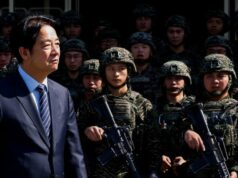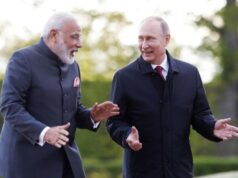Doulat Kuanyshev is a veteran Kazakh diplomat who has been the country’s ambassador to seven countries, including Israel, Sri Lanka and India, and permanent representative to various international organisations. He has also served as Press Secretary of the President of Kazakhstan, Chairman of the country’s Investment Agency and Deputy Foreign Minister. Several Indian diplomats have described him as one of India’s best friends.
He is now the Expert in the Military-Political Dimension of the Conference on Interaction and Confidence Building Measures in Asia (CICA). A multi-national forum for promoting peace, security and stability in Asia, CICA has 28 member states, including India, China and Russia,10 observer states, including the U.S. and Japan, and five observer organisations, including the U.N., and the 57-member Organisation for Security and Cooperation in Europe, or OSCE.
It also has six partner organisations, including the Shanghai Cooperation Organisation and its counter-terrorist structure, called the Regional Anti-Terrorist Structure, or RATS.
Speaking to StratNews Global a day before the 24th summit of the Shanghai Cooperation Organisation in Astana on July 4, Ambassador Kuanyshev spoke about the evolution of CICA and the SCO.
He explained how the latter morphed from the Shanghai Five, which essentially dealt with border issues between Russia, China, and the newly formed Central Asian States after the dissolution of the Soviet Union, into an organisation that grapples with the “three evils” of ‘Terrorism, extremism and separatism’ while also encouraging connectivity among the 10 member states, including the latest entrant, Belarus.
He then went on speak about the growing disenchantment with globalisation, and how the SCO could become one of the pillars of a multilateral world.
He also spoke about the growing China-Kazakhstan relationship, noting that Chinese President Xi Jinping and Kazakhstan’s President and former diplomat Kassym-Jomart Kemeluly Tokayev, who has been in office since 2019, meet at least twice a year, sometimes more.
He also pointed that President Xi had announced his flagship Belt and Road Initiative from Kazakhstan, the largest country in Central Asia and the ninth largest in the world, with major untapped energy and mineral resources.
As for India, he said the relationship had taken a bit of a beating during the pandemic, but was now recovering well, and that India’s soft power still held sway in the region. The visa-less entry for Indian tourists for 15 days was a game-changer, he said.
Asked why the formulas used to resolve the border issues between the Shanghai Five/SCO could not be applied to festering border problem between India and China, he felt that unresolved bilateral problems should not be put out for multilateral solutions, ‘because it does not make sense.’
He also spoke about the importance of diversity without compromising on common laws and regulations. To understand more about Kazakhstan’s world view, and where India figures in that, watch the full interview.
In a career spanning three decades and counting, Ramananda (Ram to his friends) has been the foreign editor of The Telegraph, Outlook Magazine and the New Indian Express. He helped set up rediff.com’s editorial operations in San Jose and New York, helmed sify.com, and was the founder editor of India.com.
His work has featured in national and international publications like the Al Jazeera Centre for Studies, Global Times and Ashahi Shimbun. But his one constant over all these years, he says, has been the attempt to understand rising India’s place in the world.
He can rustle up a mean salad, his oil-less pepper chicken is to die for, and all it takes is some beer and rhythm and blues to rock his soul.
Talk to him about foreign and strategic affairs, media, South Asia, China, and of course India.




